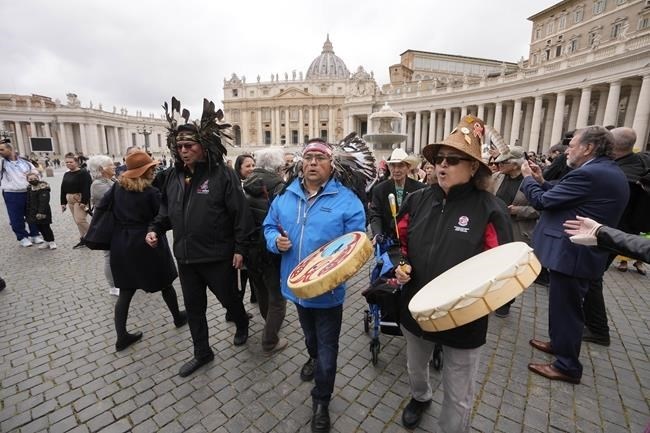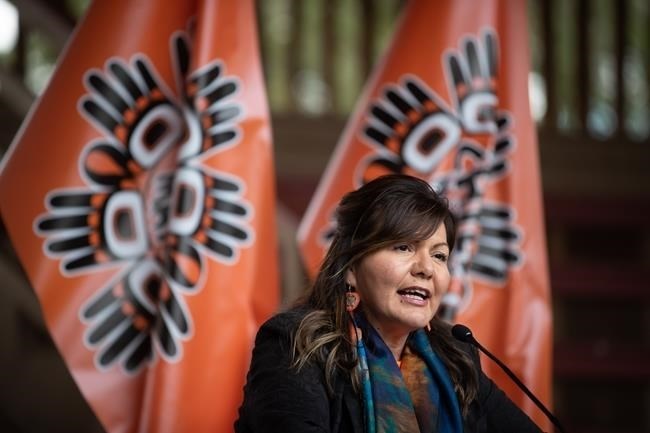
Members of the Assembly of First Nations walk in St. Peter's Square at the end of their meeting with Pope Francis at the Vatican, Thursday, March 31, 2022.
Image Credit: (AP Photo/Andrew Medichini)
March 31, 2022 - 3:30 PM
ROME - Kukpi7 Chief Rosanne Casimir says she felt the responsibility of her people flowing through her as she handed Pope Francis a handwritten invitation to visit her territory.
The Tk'emlups te Secwepemc First Nation's discovery of potential unmarked graves at the site of a former residential school in Kamloops, B.C., last year shocked many around the world and led to calls that the Roman Catholic Church be accountable.
"For over 100 years our people have been dealing with the devastating impacts of residential school," Casimir said Thursday.
Casimir also gave the Pope an eagle feather beaded in orange with small crosses. It was to serve as a reminder of the children who went to residential schools, she said, and also that "there is still much truth to be uncovered" and the church must play a role.
"This is our collective history," she said. "This is our history that we need to change for the hope for our children, our future generations. We all have to be a part of that difference."
Casimir and other First Nations delegates were emotional as they walked out of a meeting with the Pope at the Vatican to rhythmic drumming by family and community members waiting for them in St. Peter's Square.

FILE PHOTO - Tk'emlups te Secwepemc Kukpi7 (Chief) Rosanne Casimir speaks during a news conference ahead of a ceremony to honour residential school survivors and mark the first National Day for Truth and Reconciliation, in Kamloops, B.C., on Thursday, Sept. 30, 2021.
Image Credit: THE CANADIAN PRESS/Darryl Dyck
The meeting with Francis had been set for one hour, but lasted for two.
Delegates said they shared stories of residential schools and requested the Doctrine of Discovery be rescinded and Indigenous lands returned. That papal decree of 1493 allowed lands not inhabited by Christians to be claimed.
They also asked that Pope Francis travel to Canada to apologize for the church's role in residential schools and that the Catholic Church provide reparations to support healing.
The meeting marked the second time Phil Fontaine met a pope and requested an apology. He had asked that of former pope Benedict in 2009.
Fontaine, a former national chief, put abuses at the schools in the national spotlight in 1990 when he spoke about his own experiences as a child at the Fort Alexander Residential School in Manitoba.
Fontaine said he is certain that, this time, an apology will come. Unmarked graves found at several former residential school sites "shocked Canada out of its complacency" and have put incredible pressure on the church, he said.
"The eyes of the world were upon us here."
While the Pope did not commit to an apology or even a trip to Canada, Fontaine said it has been suggested that the Holy Father could visit this summer. Fontaine expects the Pope to make that clear during a final meeting Friday with First Nations, Métis and Inuit delegates. Metis and Inuit delegates had separate meetings with the Pope on Monday.
For many delegates, the meetings have been an important part of healing.
"Despite our collective grief and pain, there comes hope for change," said Chief Gerald Antoine, First Nations lead delegate.
"This change will bring dignity, equality, trust and an opportunity for this change to happen."
An estimated 150,000 Indigenous children were forced to attend residential schools. More than 60 per cent of the schools were run by the Catholic Church.
Some First Nations delegates spoke about how they were conflicted by their own participation. Elder Fred Kelly, who served as a spiritual adviser and is a residential school survivor, said he carries a lot of resentment.
He recalled how he showed up to an institution that was supposed to be a school. He had his braids shorn, traditional clothing taken away and was beaten for speaking his language. For a long time after he couldn't believe in any God, he said.
But in the room with the Pope, he took out his sacred pipe and raised it in four directions. Then he touched the Pope's head, shoulder, heart and other shoulder. Kelly said he looked at the man who heads the church that caused him harm and said, "I love you."
"That is an honourable experience," Kelly said.
The elder said he could connect with Pope Francis because he is a human being with a heart and with compassion.
The delegates presented the Pope with a pair of moccasins, a beaded brooch and literature.
Michelle Schenandoah, a member of the Oneida Nation Wolf Clan of the Haudenosaunee Confederacy, brought an intricate cradleboard.
It represents family and the church's role in breaking apart the essential bonds in Indigenous life, she said, but the Pope won't be allowed to keep it.
Schenandoah said she will retrieve it from him on Friday and take it back to her community.
“That’s symbolic of us bringing our children home."
This report by The Canadian Press was first published March 31, 2022.
News from © The Canadian Press, 2022